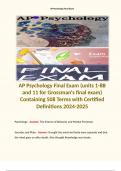Exam (elaborations)
AP Psychology Final Exam (units 1-8B and 11 for Grossman's final exam) Containing 508 Terms with Certified Definitions . Sample:
- Course
- Institution
AP Psychology Final Exam (units 1-8B and 11 for Grossman's final exam) Containing 508 Terms with Certified Definitions . Sample: Socrates and Plato - Answer: thought the mind and body were separate and that the mind goes on after death. Also thought Knowledge was innate.
[Show more]



